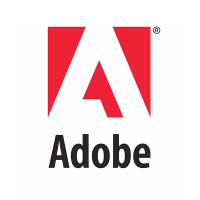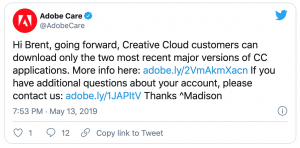Difference between revisions of "Adobe Inc."
(→VoCo: added new citation to voco section) |
(→Monopolistic Practices: added citation to Australian controversy section) |
||
| Line 15: | Line 15: | ||
==Ethical Concerns== | ==Ethical Concerns== | ||
===Monopolistic Practices=== | ===Monopolistic Practices=== | ||
| − | Concerns have arisen that Adobe engages in monopolistic practices as a result of its dominant market position in the creative industry. | + | Concerns have arisen that Adobe engages in monopolistic practices as a result of its dominant market position in the creative industry.<ref name="australia">Toor, A. (2013, February 12). Adobe drops price of Creative Cloud in Australia ahead of government inquiry. The Verge. https://www.theverge.com/2013/2/12/3979690/adobe-reduces-price-of-creative-cloud-in-australia-ahead-of-inquiry</ref> |
| − | One such controversy occurred over the pricing of Adobe’s Creative Cloud service. The cost of Adobe Creative Cloud varies across national borders, and is significantly higher in certain countries such as [[Wikipedia:Australia|Australia]]. In 2013, the [[Wikipedia:Australian Parliament|Australian Parliament]] launched an inquiry into the pricing of software in Australia by international tech corporations, and summoned Adobe executives to a public hearing. After the hearing, Adobe significantly lowered its prices for Australian customers. | + | One such controversy occurred over the pricing of Adobe’s Creative Cloud service. The cost of Adobe Creative Cloud varies across national borders, and is significantly higher in certain countries such as [[Wikipedia:Australia|Australia]]. In 2013, the [[Wikipedia:Australian Parliament|Australian Parliament]] launched an inquiry into the pricing of software in Australia by international tech corporations, and summoned Adobe executives to a public hearing. After the hearing, Adobe significantly lowered its prices for Australian customers.<ref name="australia"></ref> |
[[File:Freehand.jpeg|300px|thumb|right|Screenshot of FreeHand]] | [[File:Freehand.jpeg|300px|thumb|right|Screenshot of FreeHand]] | ||
Revision as of 15:47, 26 March 2021
Adobe Inc., commonly referred to as “Adobe”, is a large international software corporation headquartered in San Jose, California. Adobe primarily develops software products targeted at the creative industry. Notable Adobe products include Photoshop (an image editing program), Premiere Pro (a video editing program), Illustrator (an illustration program utilizing vector graphics), and Flash (a discontinued software platform used to create interactive web applications). Adobe is also notable for inventing the widely-used PDF file format, which was later turned into an International Standard. Most of Adobe’s revenue is generated by the Adobe Creative Cloud, a subscription service that grants users access to the majority of software products offered by Adobe.
Contents
History

Adobe Inc. was founded as Adobe Systems Inc. in 1982 by John Warnock and Charles Geschke. Adobe’s first product was the PostScript programming language, used by digital printers to structure documents. Adobe quickly became profitable due to an early order by Steve Jobs, the CEO of Apple Computer Inc. Building on the success of PostScript, Adobe entered the consumer software industry in the late 1980s with the release of the now-flagship products Illustrator (a vector-based graphics illustration program) and Photoshop (a widespread image editing program). Both Illustrator and Photoshop quickly gained popularity in their respective fields and lifted Adobe to a dominant position in the creative industry.
In the 1990s and 2000s, Adobe continued expanding via both releases of new products like the PDF file format and the Premiere Pro video editing software as well as mergers and acquisitions of competitors such as Macromedia Inc. and Aldus Corporation. In the early 2010s, Adobe and longtime partner Apple Inc. had a falling out over Apple Inc.’s refusal to support Adobe’s interactive web application platform Adobe Flash on Apple Inc.’s consumer electronics such as the iPhone and iPad. Apple Inc. CEO Steve Jobs outlined concerns over the security and reliability of Adobe Flash as well as concerns about the business practices of Adobe itself in a viral blog post titled “Thoughts on Flash”.
As the decade progressed, Adobe continued its growth independently and pivoted its business approach. Previously, Adobe had sold its software products in a downloadable one-time purchase bundle called the Adobe Creative Suite. However, in 2013, Adobe switched to a monthly subscription-based model called the Adobe Creative Cloud. This transition marked the first time a major software corporation made such a move, and signaled the start of similar transformations across the technology industry in the coming years.
Ethical Concerns
Monopolistic Practices
Concerns have arisen that Adobe engages in monopolistic practices as a result of its dominant market position in the creative industry.[2] One such controversy occurred over the pricing of Adobe’s Creative Cloud service. The cost of Adobe Creative Cloud varies across national borders, and is significantly higher in certain countries such as Australia. In 2013, the Australian Parliament launched an inquiry into the pricing of software in Australia by international tech corporations, and summoned Adobe executives to a public hearing. After the hearing, Adobe significantly lowered its prices for Australian customers.[2]
Another controversy arose over FreeHand, a vector graphics illustration program that directly competed with Adobe Illustrator. FreeHand and Illustrator were the two major players in the digital illustration industry, and each had a large user base. In 1994, Adobe acquired Aldus Corporation, the owner of FreeHand, resulting in Adobe having dominant control over the digital illustration industry. Due to concerns about this new monopoly, the Federal Trade Commission intervened and forced Adobe to sell FreeHand to a competitor. Then, in 2005, Adobe acquired Macromedia Inc., the new owner of FreeHand. The Federal Trade Commission did not intervene with this acquisition, and Adobe proceeded to discontinue development of FreeHand the following year. This move caused backlash from FreeHand’s users and led to a class-action lawsuit against Adobe in 2011. The lawsuit said that Adobe had violated California and United States antitrust laws through its acquisition of Macromedia Inc. and now held an unfair monopoly over the digital illustration industry. Adobe settled the lawsuit by agreeing to incorporate features of FreeHand into Illustrator.
VoCo
Adobe VoCo is an experimental voice editing software. Using audio files of a human speaker, VoCo is able to generate new audio of that speaker saying words they did not originally speak.[3] VoCo has raised concerns because it has great potential for misuse by malicious actors. VoCo’s audio alteration capabilities could potentially be used as part of smear or misinformation campaigns in order to generate audio where a targeted human speaker is heard saying words they never said.[3] VoCo additionally may be used to generate audio capable of fooling voice-based security systems.[3]
Software Version Restrictions
Adobe's business model in its first three decades largely revolved around distributing licensed software products to customers via CD-ROMS in one-time transactions[4]. This mindset carried over to the Adobe Creative Suite, a comprehensive bundle of Adobe software products, that was released in 2003 for an upfront price of $1800[4].
However, in 2013, the Adobe Creative Suite software bundle was discontinued and officially replaced by the Adobe Creative Cloud subscription-based service that retailed for $50 a month[4]. The transition in business model altered how customers were able to access Adobe products and led to legal action taken in March 2019 by Dolby Labs, a licenser of Adobe software, against Adobe over the management of licensing costs under the new subscription-based business model[5][6][7]. The legal conflict between the two companies over Adobe's Software as a Service (SaaS) transition resulted in another change made to Adobe’s business model in the following months.
In May 2019, Adobe released a statement stating that, from then on, customers were only allowed to use the most recently updated versions of its software products available via Creative Cloud. Furthermore, Adobe stated that customers who continued to use any previously purchased versions of Adobe software that predated the Creative Cloud would be in violation of Adobe’s terms and conditions and would therefore be liable to lawsuits by third-party companies[5][6][7]. The decree also prohibited usage of certain software whose inclusion in the Creative Cloud collection was being discontinued and restated the same legal consequences for non-compliance. Though not explicitly specified, the third-party mentioned in Adobe's statement was said by media outlets such as Vice Media and Daily Mail to be Dolby Labs due to its recent legal battle with Adobe[5][6][7]. Customer backlash ensued over Adobe’s mandate[7]. Under Adobe’s earlier license-based business model, users who paid for software products were granted a license that gave them ownership over their copy of the software, meaning the software was the customer’s to keep if he or she purchased it. Under the newer SaaS business model however, customers had no ownership of any copy of software, meaning that Adobe had the full ability to restrict usage of certain software or software versions to users[7].
Copyright expert Dylan Gilbert said that Adobe's decision jeopardized customers’ existing projects as newer versions of software may initially be more unstable and susceptible to bugs.[5][6]. Additionally, Gilbert said “Adobe...has the power to force its customers to upgrade to newer more expensive versions at its whim, which illustrates the undue power and influence...over the lives of consumers”[6].
References
- ↑ Cassidy, M. (2009, December 3). Cassidy: More than business for Adobe’s founders. The Mercury News. https://www.mercurynews.com/2009/12/03/cassidy-more-than-business-for-adobes-founders/
- ↑ 2.0 2.1 Toor, A. (2013, February 12). Adobe drops price of Creative Cloud in Australia ahead of government inquiry. The Verge. https://www.theverge.com/2013/2/12/3979690/adobe-reduces-price-of-creative-cloud-in-australia-ahead-of-inquiry
- ↑ 3.0 3.1 3.2 Lardinois, F. (2016, November 3). Adobe’s Project VoCo lets you edit speech as easily as text. TechCrunch. https://techcrunch.com/2016/11/03/adobes-project-voco-lets-you-edit-speech-as-easily-as-text/
- ↑ 4.0 4.1 4.2 How Adobe Became a Successful $95 Billion Saas Company. (n.d.). Product Habits Blog. https://producthabits.com/adobe-95-billion-saas-company/
- ↑ 5.0 5.1 5.2 5.3 Gallagher, W. (2019, May 13). Adobe warning of legal problems if subscribers keep using old versions of Creative Cloud apps [u]. Apple Insider. https://appleinsider.com/articles/19/05/13/adobe-warning-of-legal-problems-if-users-keep-using-old-versions-of-creative-cloud-apps
- ↑ 6.0 6.1 6.2 6.3 6.4 Bode, K. (2019, May 14). Adobe Tells Users They Can Get Sued for Using Old Versions of Photoshop. Vice. https://www.vice.com/en/article/a3xk3p/adobe-tells-users-they-can-get-sued-for-using-old-versions-of-photoshop
- ↑ 7.0 7.1 7.2 7.3 7.4 Pero, J. (2019, May 15). Outrage after Adobe says customers using an older version of Photoshop may be SUED if they continue - even though they paid for the software. Daily Mail. https://www.dailymail.co.uk/sciencetech/article-7034239/Outrage-Adobe-says-customers-using-older-version-Photoshop-SUED-continue.html



